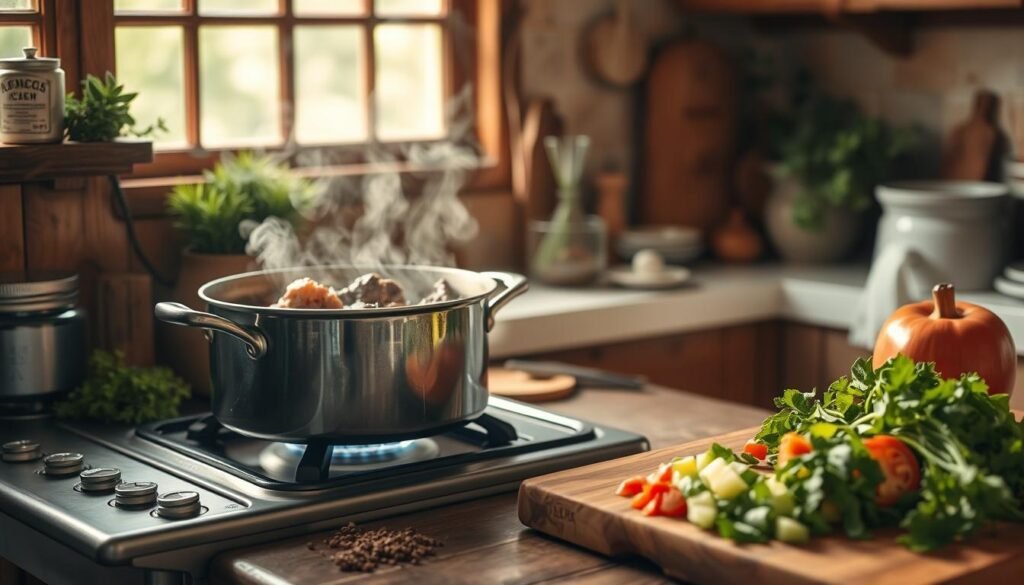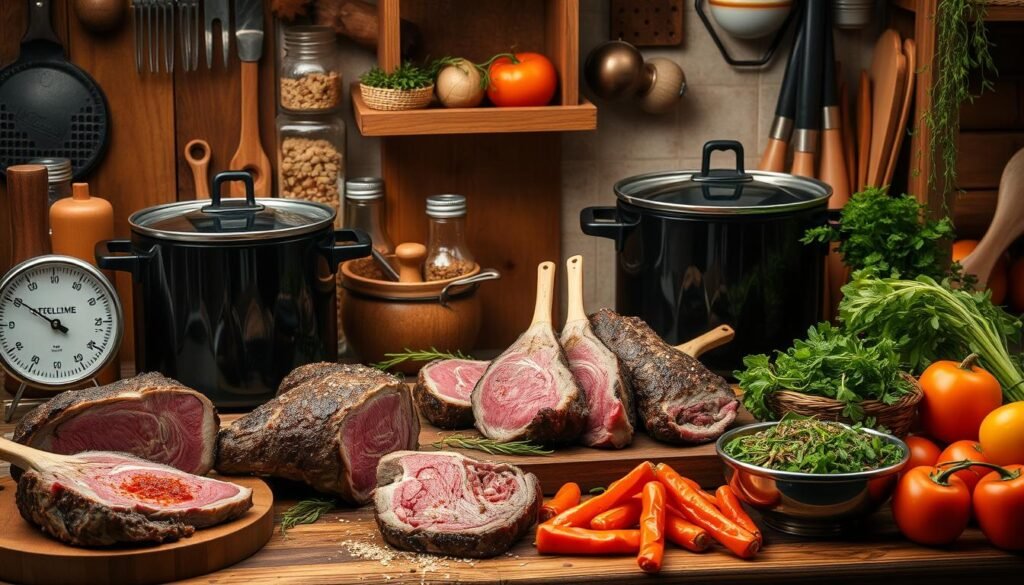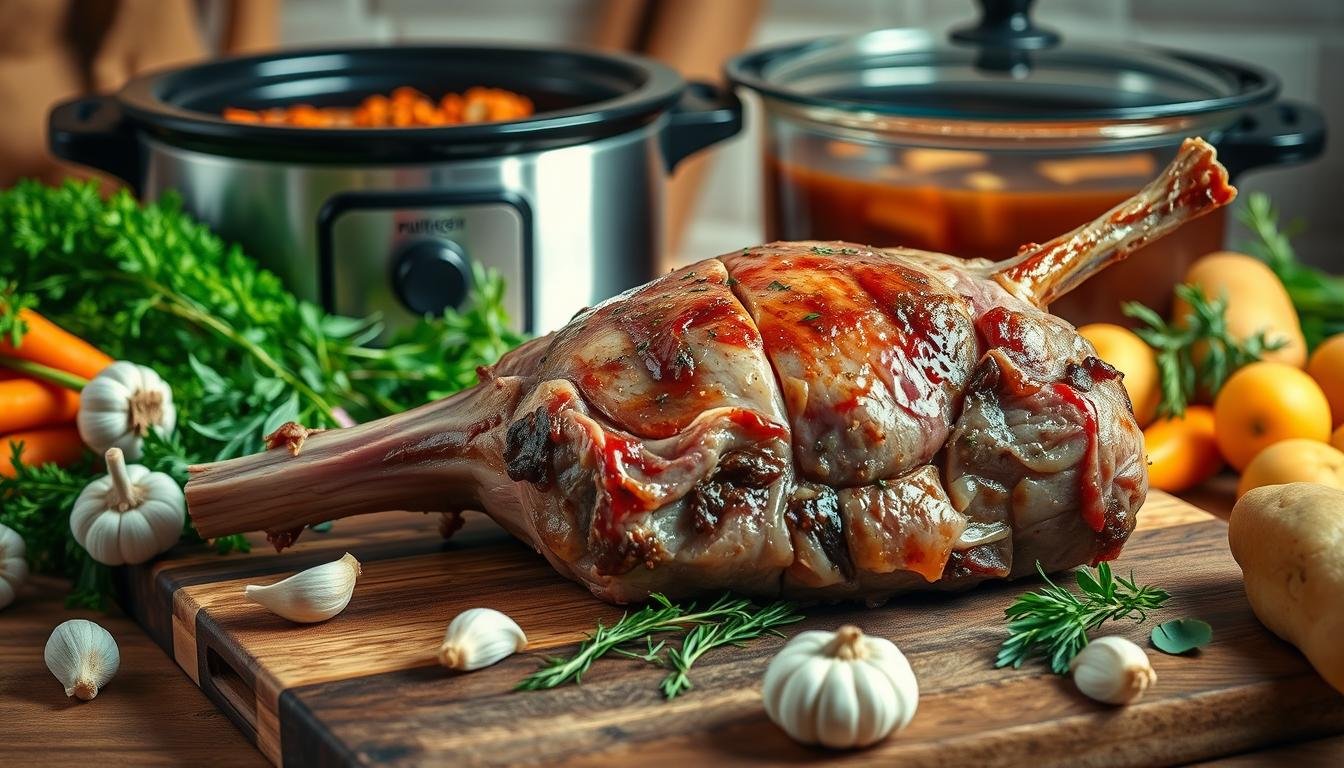How to Make Perfect Slow-Cooked Lamb Every Time
The smell of slow-cooked lamb in the kitchen brings back family memories. As an American home cook, you might be surprised by lamb’s hidden culinary value. Despite Americans eating only a pound of lamb a year, it’s a meat that can greatly improve your cooking.
Slow-cooked lamb is more than a meal; it’s a journey that turns simple meat into a tender, flavorful dish. Whether it’s braised lamb shanks for a special event or a weekend dinner, mastering slow cooking can make any dish special.
Americans are finding out that with the right techniques, slow-cooked lamb can be a showstopper. The American Lamb Council says 75% of lamb lovers prefer it cooked to a perfect medium. This shows a growing love for lamb’s rich, juicy taste.
Table of Contents
Understanding Slow-Cooked Lamb: Benefits and Basics
Slow cooking turns regular lamb into a special dish. It breaks down tough parts, making the meat tender and easy to eat. Whether you’re making a lamb stew or ragout, knowing the basics can improve your cooking.
What is Slow Cooking?
Slow cooking is a gentle way to cook food at low temperatures for a long time. For lamb, this means cooking it for 4-8 hours. This makes the meat tender and adds deep flavors.
- Low and consistent temperature
- Extended cooking duration
- Minimal hands-on preparation
Why Choose Lamb?
Lamb is great for slow cooking because of its flavor and health benefits. It’s full of high-quality protein and important nutrients. This makes it perfect for lamb ragout and stews.
| Nutritional Benefit | Details |
|---|---|
| Protein Quality | Complete protein with all nine essential amino acids |
| Iron Content | High in easily absorbed heme iron |
| Vitamin Profile | Rich in B vitamins, supporting energy and brain health |
Key Flavor Profiles for Lamb
Lamb takes flavors well, making it great for memorable dishes. Mediterranean flavors like garlic, rosemary, and thyme go well with its taste.
“Slow cooking transforms lamb from a simple meat to a culinary masterpiece.” – Culinary Expert
Learning these basics will help you make amazing lamb dishes. They will impress and satisfy everyone.
Choosing the Right Cut of Lamb
Choosing the right lamb cut can make your cooking better, whether it’s a lamb curry or a lamb tagine. Knowing the differences in cuts can make your dish tender and full of flavor.
Lamb comes in many cuts, each with its own special qualities. The right cut can change how your dish tastes and feels.
Best Cuts for Slow Cooking
For slow-cooked dishes like lamb curry or lamb tagine, some cuts are better:
- Lamb shoulder: Rich in fat and connective tissue
- Lamb shanks: Perfect for braising
- Lamb neck: Ideal for stews and long cooking times
- Leg of lamb: Versatile and flavorful
Factors to Consider When Selecting Lamb
When picking your lamb, remember these important points:
- Age of the lamb: Younger lamb is usually more tender
- Fat content and marbling
- Bone-in vs. boneless cuts
- Intended cooking method
Organic vs. Conventional Lamb
“The quality of your meat defines the soul of your dish.” – Chef’s Wisdom
Pasture-raised lamb is better for you:
- Higher omega-3 fatty acids
- Increased vitamin content
- Enhanced mineral profile
- Better animal welfare practices
Choosing the right lamb can make your dishes like lamb curry and lamb tagine amazing. Knowing these details can help you cook like a pro at home.
Essential Ingredients for Flavorful Slow-Cooked Lamb
To make the perfect lamb dish, you need the right ingredients. Whether it’s lamb barbacoa or navarin, knowing the best herbs, spices, and liquids is key. This will make your dish a hit.
Choosing the right ingredients for slow-cooked lamb is important. The right mix can turn a simple meal into a memorable one.
Must-Have Herbs and Spices
The flavor of your lamb comes from the herbs and spices you use. Here are some top picks:
- Rosemary: Gives a strong, earthy taste
- Thyme: Adds a subtle, aromatic flavor
- Garlic: Makes the meat richer
- Oregano: Adds a Mediterranean twist
- Cinnamon: Adds a unique depth
Vegetables That Enhance Taste
Vegetables do more than just fill space. They enhance the flavor of your lamb. For barbacoa or navarin, try these:
- Onions: Make a sweet, caramelized base
- Carrots: Add a natural sweetness
- Celery: Adds a subtle complexity
- Tomatoes: Bring a rich, acidic taste
Broths and Liquids: What’s Best?
| Liquid | Flavor Profile | Best Used With |
|---|---|---|
| Red Wine | Rich, complex | Lamb navarin |
| Beef Stock | Hearty, deep | Lamb barbacoa |
| Tomato Sauce | Bright, tangy | Mediterranean-style lamb |
| Lemon Juice | Bright, citrusy | Greek-inspired dishes |
The secret to amazing slow-cooked lamb is balancing flavors. Let the ingredients blend together as it cooks. Experiment to find your favorite mix!
Preparing Your Lamb for Cooking
Getting your lamb ready for a delicious slow-cooked meal requires careful preparation. Whether you’re planning a classic lamb rogan josh or a spicy lamb vindaloo, the right technique can transform an ordinary cut into a memorable dish.
Trimming the Meat with Precision
Start by examining your lamb cut carefully. Remove excess fat, but leave a thin layer to keep the meat moist during cooking. For lamb rogan josh, you’ll want uniform pieces that cook evenly.
- Use sharp kitchen shears for precise trimming
- Aim to remove thick external fat deposits
- Keep a consistent size for even cooking
Seasoning Techniques That Elevate Flavor
Seasoning is key for deep flavors in your lamb vindaloo or rogan josh. Generously coat the meat with a blend of salt, pepper, and your chosen spices.
“The secret to great lamb is in the seasoning” – Professional Chef
Marinating: Unlocking Maximum Flavor
Marinating can dramatically enhance your lamb’s tenderness and taste. For small cuts, marinate for 4-6 hours. Larger pieces can benefit from up to 24 hours of marination.
| Cut Size | Recommended Marination Time |
|---|---|
| Small Cuts | 4-6 hours |
| Large Cuts | Up to 24 hours |
Searing: The Critical Pre-Cooking Step
Before slow cooking, sear your lamb to create a flavorful crust. Heat a pan with oil until smoking hot, then brown the meat on all sides. This technique locks in juices and develops a rich, complex flavor profile.
- Use high heat for quick searing
- Turn meat to brown all sides evenly
- Pat meat dry before searing to ensure proper browning
Slow Cooking Methods: Choosing the Best One
Exploring the right cooking method can make your slow-cooked lamb truly exceptional. Different techniques offer unique advantages for preparing braised lamb shanks and other delicious cuts.
Choosing the ideal cooking method depends on several factors. These include your available time, kitchen equipment, and desired flavor profile. Let’s explore the most popular slow cooking approaches for tender, mouth-watering lamb dishes.
Slow Cooker: The Convenient Option
Slow cookers make preparing slow-cooked lamb easy. With minimal supervision, you can achieve incredibly tender meat. Here are key benefits:
- Set-and-forget convenience
- Consistent low-temperature cooking
- Ideal for busy home cooks
- Perfect for braised lamb shanks
Oven Braising: Precision and Control
Oven braising gives you more temperature control for your slow-cooked lamb. Recommended temperatures are between 300-350°F. This allows for even cooking and deep flavor development.
Dutch Oven: Versatility in One Pot
A Dutch oven combines stovetop searing and oven braising in one vessel. This method ensures maximum flavor retention for your slow-cooked lamb.
Pro tip: For the most tender braised lamb shanks, cook at a low temperature for an extended period.
Timing Considerations
Cooking times vary based on your chosen cut and method:
- Slow cooker: 6-8 hours on low heat
- Oven braising: 2.5-3 hours at 350°F
- Lamb shanks: Approximately 3-4 hours
Regardless of your chosen method, patience is key. It’s essential for achieving perfectly tender, flavorful slow-cooked lamb.
Adding Depth: Cooking Techniques to Enhance Flavor
Making a great lamb stew or lamb ragout is more than just mixing ingredients. Professional chefs know that adding layers of flavor and using special cooking methods can turn a simple dish into a work of art.

Layering Ingredients for Maximum Flavor
When making a lamb ragout, the order of your ingredients is key. Begin with a base of aromatic veggies like:
- Onions
- Garlic
- Carrots
- Celery
Fat: The Flavor Carrier
Fat is essential for rich flavors in your lamb stew. Natural lamb fat and cooking oils spread out seasonings and keep meat soft.
| Fat Type | Flavor Profile | Cooking Temperature |
|---|---|---|
| Lamb Fat | Rich, Intense | 375-450°F |
| Olive Oil | Smooth, Mild | 190-250°F |
| Butter | Creamy, Nutty | 300-350°F |
The Art of Deglazing
Deglazing is a key technique for your lamb ragout. After searing the meat, add wine or stock to the pan. This captures the flavorful browned bits, adding depth to your dish.
“The secret to an extraordinary lamb stew lies in the details of preparation.” – Culinary Expert
By using these techniques, you can turn your lamb dishes into unforgettable meals.
Serving Suggestions for Your Slow-Cooked Lamb
Presenting your slow-cooked lamb is a fun challenge. With over 70% of people choosing lamb for special events, your presentation can make the meal unforgettable.
Ideal Side Dishes to Complement Your Lamb
Choosing the right sides can make your lamb curry or tagine stand out. Here are some tasty options:
- Roasted root vegetables (served in 65% of slow-cooked lamb dishes)
- Creamy Parmesan polenta with its slightly sweet flavor
- Saffron rice with aromatic reddish threads
- Smashed potatoes with crispy exterior and buttery center
Presentation Tips for a Beautiful Table
Make your lamb look stunning. Pro tip: Serve it in the cooking pot for a cozy family meal. Or, plate it individually with sauce and herbs for a fancy look.
“The art of serving is just as important as the cooking itself.” – Culinary Wisdom
Leftover Lamb: Creative Culinary Adventures
Don’t waste your delicious lamb! Store it in the fridge for up to three days. Then, turn it into new dishes:
- Shepherd’s pie – a classic British favorite
- Greek lamb baguette for gourmet lunches
- One-pan lamb tagine serving up to six people
- Sri Lankan lamb stir-fry with coconut curry sauce
Being creative with leftovers can lead to amazing dishes. Try new spices like harissa to give your lamb a fresh twist. This way, you’ll also help reduce food waste.
Troubleshooting Common Issues
Slow-cooking lamb can be tricky, even for experienced home chefs. Knowing the common problems helps you make perfect lamb barbacoa or lamb navarin every time.

When Lamb Turns Tough: Diagnosing the Problem
Tough lamb usually comes from wrong cooking methods. The main reasons are:
- Insufficient cooking time
- High cooking temperatures
- Choosing the wrong meat cuts
Temperature and Time: The Critical Factors
Getting tender lamb takes patience. The meat should reach about 175°F for it to be tender. Slow cookers are great for making tough cuts tender.
“Slow cooking is an art of patience and precision.”
Fixing Flavor Challenges
If your lamb barbacoa tastes flat, try these tips to add flavor:
- Use more aromatic herbs and spices
- Add a bit of lemon juice for acidity
- Arrange ingredients in layers
Cooking Time Adjustments
| Lamb Cut | Recommended Cooking Time | Internal Temperature |
|---|---|---|
| Lamb Shanks | 4-6 hours | 175°F |
| Leg of Lamb | 6-8 hours | 145°F |
| Lamb Shoulder | 5-7 hours | 165°F |
Always check with a meat thermometer for the right doneness. Remember, each time you open the slow cooker lid, it adds 30 minutes to cooking time.
Final Tips for Perfect Slow-Cooked Lamb
Mastering slow-cooked lamb takes patience and creativity. Whether you’re making a classic lamb rogan josh or trying a spicy lamb vindaloo, each time is a chance to get better. Professional chefs say to keep notes on your techniques, ingredients, and results.
Learning about lamb means understanding spices and cooking methods. Use red wine or pomegranate molasses to add depth. Start with spice blends like cumin and smoked paprika, but feel free to create your own flavors.
Experimenting with Ingredients
Try new ingredients in your lamb dishes. Add cider vinegar or unique herbs. Slow cooking lets flavors mix and create amazing tastes.
Maintaining Consistency
Keep detailed records of your cooking. Note oven temperatures, marinating times, and seasoning amounts. This helps you make dishes again and get better with each try.
Learning from Each Cook
Every lamb dish teaches you something. Enjoy both successes and mistakes as chances to learn. As you cook more, you’ll get better at different cuts, methods, and flavors.
FAQ
What is the best cut of lamb for slow cooking?
How long should I cook lamb in a slow cooker?
Do I need to marinate lamb before slow cooking?
What herbs and spices work best with lamb?
Can I cook lamb in the oven instead of a slow cooker?
What should I do if my lamb turns out tough?
What are some good side dishes to serve with slow-cooked lamb?
How can I add more flavor to my slow-cooked lamb?
Source Links
- The Best Greek-style Slow Roasted Leg of Lamb – https://www.familysavvy.com/fork-tender-greek-style-leg-of-lamb/
- Slow Cooked Lamb Shoulder – https://www.notquitenigella.com/2024/04/17/slow-cooked-lamb-shoulder/
- Overnight Slow Cooker Lamb – https://myanosmickitchen.com/overnight-slow-cooker-lamb/
- A Beginner’s Guide to Cooking Lamb: Tips for Perfectly Tender Meat Every Time – superior farms denver – https://superiorfarmsdenver.com/a-beginners-guide-to-cooking-lamb-tips-for-perfectly-tender-meat-every-time/
- Top 5 Benefits of Lamb Meat Diet | New Zealand Spring Lamb – https://nzspringlamb.com/top-5-reasons-to-add-new-zealand-spring-lamb-to-your-diet/
- Top 10 Lamb Cuts Explained | Acabonac Farms – https://www.acabonacfarms.com/blogs/in-the-kitchen/best-lamb-cuts-and-parts?srsltid=AfmBOorremnGp0kYENVwOoYT65tuqFIvjMnE-oBRSBVpvd1aqUMqnUl1
- Savor the Flavor: Expert Tips for Selecting and Preparing Lamb Cuts – https://www.theflyingbutcher.com/blog/savor-the-flavor-expert-tips-for-selecting-and-preparing-lamb-cuts
- Slow-cooker Lamb Shoulder Recipe | Simple Home Edit – https://simplehomeedit.com/recipe/slow-cooker-lamb-shoulder/
- Slow Cooker Lamb Stew – https://theflavoursofkitchen.com/lamb-stew/
- Slow-Cooker Lamb Chops – https://www.tasteofhome.com/recipes/slow-cooked-lamb-chops/?srsltid=AfmBOorbOsyfI1KMheXztjuDQjwlG-NFUDiVTck3vk3KBIBPfV5gta2v
- Simplest Roast Lamb Shoulder Recipe | New Zealand Spring Lamb – https://nzspringlamb.com/lamb-shanks-with-parsnip-puree-pear-raisin-chutney/
- This Is How An Executive Chef Slow Cooks Lamb For Perfectly Flavorful Results Every Time – Tasting Table – https://www.tastingtable.com/1581250/how-to-cook-lamb-best-results/
- Slow Cooked Lamb: A Delicious and Juicy Recipe | The Curry Guy – https://greatcurryrecipes.net/2024/09/07/slow-cooked-lamb/
- Top 10 Lamb Cuts Explained | Acabonac Farms – https://www.acabonacfarms.com/blogs/in-the-kitchen/best-lamb-cuts-and-parts?srsltid=AfmBOoqQabLrYpyS5p0Mu9PXKNvjCZHHBpHAkMVcPbPTTm-9Uyq2bnG7
- Slow Cooker Lamb Shoulder Chops – Healthy Recipes Blog – https://healthyrecipesblogs.com/slow-cooker-lamb-shoulder-chops/
- How to cook roast lamb – https://www.petergbouchier.com.au/blogs/information-centre/how-to-cook-roast-lamb?srsltid=AfmBOoq1TiSXe4b-aeAs4-mZ6KBvnHUqckLW-GId4T91h3oXthg_Z4a6
- Slow Cooked Lamb Chops and Potatoes (In Red Wine) – https://nikolopaa.com/slow-cooked-lamb-chops-potatoes-in-red-wine/
- HOW TO PREPARE LAMB THE HEALTHIER WAY – https://nzspringlamb.com/how-to-prepare-lamb-the-healthier-way-3/
- What To Serve With Roast Lamb – 10 Roast Night Sides! – The Irishman’s Wife – https://www.theirishmanswife.com/roast-lamb-sides/
- 40 Side Dishes That Turn Your Lamb Into A Holiday-Worthy Feast – https://www.delish.com/holiday-recipes/easter/g42642114/side-dishes-for-lamb/
- What to do with leftover lamb – https://www.bbcgoodfood.com/howto/guide/what-do-leftover-lamb
- Mistakes Everyone Makes When Using The Slow Cooker – Mashed – https://www.mashed.com/41195/11-mistakes-everyone-makes-using-slow-cooker/
- Cooking Temperatures And Tips For Lamb To Ensure It’s Just Right Every Time – https://www.southernliving.com/food/meat/lamb/cooking-temperatures-for-lamb?srsltid=AfmBOoqs_RRKR-wW34HkBmUFY_EefVFoVmQ9eI6t-ThbdO1BEBiKZaj5
- 12-Hour Lamb Shoulder · Chef Not Required… – https://www.chefnotrequired.com/12-hour-lamb-shoulder/
- THE SLOW-ROAST SHOULDER OF LAMB THAT THINKS IT’S SMOKED BRISKET. – https://jilldupleix.substack.com/p/the-slow-roast-shoulder-of-lamb-that

